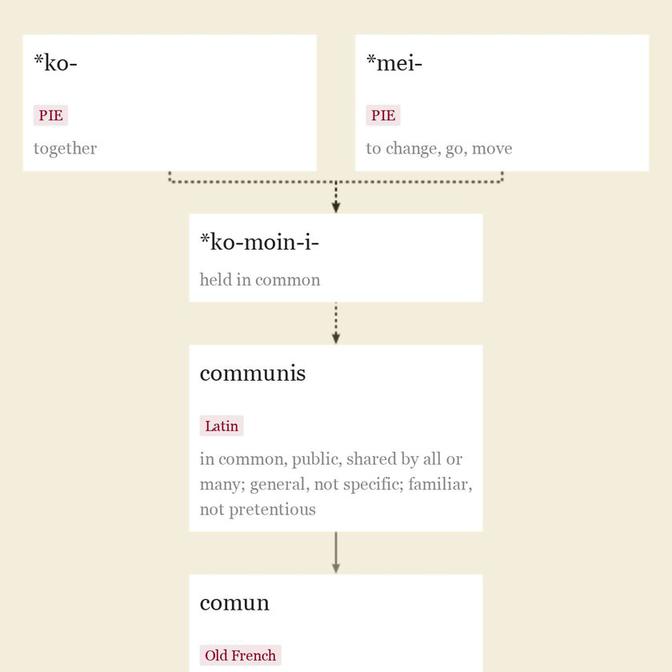mean (v.1)
"intend, have in mind;" Middle English mēnen, from Old English mænan "intend (to do something), plan; indicate (a certain object) or convey (a certain sense) when using a word," from Proto-West Germanic *menjojanan (source also of Old Frisian mena "to signify," Old Saxon menian "to intend, signify, make known," Dutch menen, German meinen "think, suppose, be of the opinion"), from PIE *meino- "opinion, intent" (source also of Old Church Slavonic meniti "to think, have an opinion," Old Irish mian "wish, desire," Welsh mwyn "enjoyment"), perhaps from root *men- (1) "to think."
From late 14c. as "have intentions of a specified kind" (as in to mean well). Of a person or thing, "to be of some account, to matter (to)," by 1888. Conversational question you know what I mean? attested by 1834.
mean (adj.1)
c. 1200, mēne, "shared by all, common, general," a sense now obsolete, shortened from imene, from Old English gemæne "common, public, general, universal, shared by all," from Proto-Germanic *ga-mainiz "possessed jointly" (source also of Old Frisian mene, Old Saxon gimeni, Middle Low German gemeine, Middle Dutch gemene, Dutch gemeen, German gemein, Gothic gamains "common"), from PIE *ko-moin-i- "held in common," a compound adjective formed from collective prefix *ko- "together" (Proto-Germanic *ga-) + *moi-n-, suffixed form of PIE root *mei- (1) "to change; exchange." Compare second element in common (adj.), a word with a sense evolution parallel to that of this word.
Meaning "of common or low origin, inferior in rank or status" (of persons) is attested from early 14c. Sense of "ordinary, inferior in attainment or skill" is from late 14c. Also from late 14c. as "poor in quality, of little value," though this sense survived longer in American than in England. James Stirling, in "Letters from the Slave States" [London, 1857], mentioning mean whites (poor whites in the South who do manual labor and are looked down on by the slaves) notes, " 'Mean' is an Americanism for 'poor,' 'shabby.' They speak here of a 'mean' hotel, a 'mean' dinner, &c."
The pejorative sense of "without dignity of mind, destitute of honor, low-minded" is from 1660s; the specific sense of "stingy, niggardly" is recorded by 1755; the weaker sense of "disobliging, pettily offensive" is from 1839, originally American English slang. All these developments of the English word were furthered by its coincidence in form with mean (adj.2) "middle, middling," which also was used in disparaging senses, and OED notes that some usages of mean it cites "might be referred almost equally to the native and to the foreign adj.; the truth is probably that they are of mixed ancestry."
The inverted sense of "remarkably good" (as in plays a mean Rhythm Master) first recorded c. 1900, perhaps from phrase no mean _______ "not inferior" (1590s, also, "not average," reflecting further confusion with mean (adj.2.)).
mean (n.)
"that point, place, or state which is halfway between extremes;" c. 1300, originally in music, "a tone intermediate between two other tones," from Old French meien "middle, means, intermediary," noun use of adjective from Late Latin medianus "of or that is in the middle," from Latin medius "in the middle," from PIE root *medhyo- "middle."
The modern range of senses in English mostly appeared late 14c.: "course of action; method, way of attaining an end" (as in ways and means; by means of; by all means; by no means); also "the golden mean, moderation;" and "something physically between two extremes." The mathematical sense, "a quantity having a value intermediate between the values of other quantities, the average obtained by adding several quantities together and dividing the sum by their number" is from mid-15c. Some senses reflect confusion with mean (adj.1).
mean (adj.2)
"occupying a middle or intermediate place;" mid-14c., of persons, "of middle rank" (but this is possibly from, or mixed with, mean (adj.1)); from Anglo-French meines (plural), Old French meien, variant of moiien "mid-, medium, common, middle-class" (12c., Modern French moyen), from Late Latin medianus "of the middle," from Latin medius "in the middle" (from PIE root *medhyo- "middle").
From late 14c. as "in a middle state, between two extremes." Meaning "intermediate in time, coming between two events or points in time" is from mid-15c. (the sense in meanwhile, meantime). The mathematical sense "intermediate in a number of greater or lesser values, quantities, or amounts" is from late 14c.
Trends of mean
updated on December 11, 2018
Trending words
Dictionary entries near mean
meal
mealtime
meal-worm
mealy
mealy-mouthed
mean
meander
meanie
meaning
meaningful
meaningless

